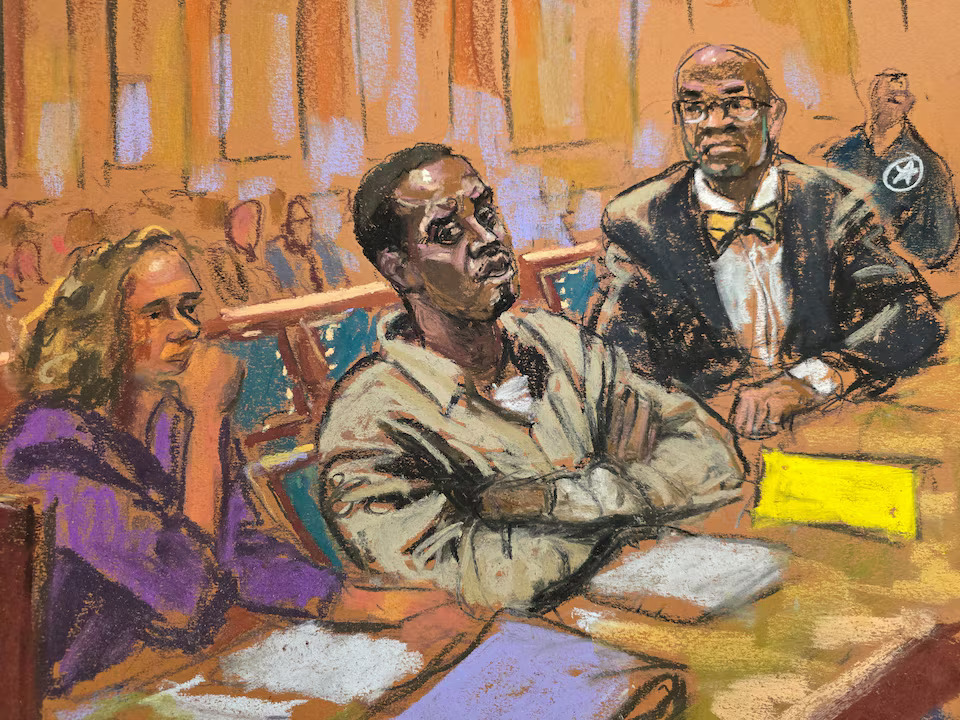Witnesses in the federal sex trafficking trial of Sean “Diddy” Combs have accused the music mogul of a range of misconduct, including bribery, drug use and witness intimidation, bolstering a racketeering case that goes beyond the core sex trafficking charges.
Combs, 55, founder of Bad Boy Records, has pleaded not guilty to five federal charges: racketeering conspiracy, two counts of sex trafficking and two counts of transporting individuals to engage in prostitution. The trial in Manhattan federal court, now entering its third week, is expected to last up to two months.
Though Combs is not charged with bribery or drug offences, prosecutors have introduced those allegations under the Racketeer Influenced and Corrupt Organisations Act, or RICO — a powerful statute originally designed to prosecute organised crime. Under RICO, prosecutors can present so-called “predicate acts” to show a pattern of criminal behaviour by a group or enterprise, even if those acts aren’t separately charged.
“RICO allows you to bring in the bigger picture,” said Bobby Taghavi, a former prosecutor and defence attorney. “His lifestyle, his power, his anger issues — the 360-degree view of his conduct.”
Prosecutors allege Combs led a network of businesses and associates, dubbed the “Combs Enterprise,” that engaged in prostitution, forced labour, drug trafficking and other crimes dating back to 2008. They claim he orchestrated drug-fueled sex parties known as “Freak Offs,” during which he used coercion, blackmail and violence to control victims.
During testimony, Combs’ ex-girlfriend, singer Casandra “Cassie” Ventura, described years of abuse, including instances of physical violence and sexual coercion. Other witnesses, including rapper Kid Cudi, alleged Combs was involved in threatening behaviour, such as breaking into his home and possibly orchestrating the destruction of his car.
A former hotel security guard testified that Combs once tried to bribe him with a stack of cash after witnessing an alleged assault. A former employee said Combs frequently used ecstasy and opiates.
Defence attorneys have pushed back against the inclusion of such testimony, arguing it is prejudicial and irrelevant to the core charges. “This is becoming a bad act free-for-all,” defence attorney Marc Agnifilo told U.S. District Judge Arun Subramanian, who has allowed much of the evidence.
Legal experts note that RICO is rarely applied in cases involving sexual abuse or trafficking. However, precedent exists, notably the 2021 conviction of R. Kelly, who unsuccessfully argued that his abuse allegations were unrelated to racketeering.
Combs’ legal team has acknowledged past abuse in his relationship with Ventura but insists the case is a mischaracterisation of consensual adult relationships. They plan to call witnesses after the prosecution rests.
Defence attorneys are expected to argue that the government has portrayed what is essentially a domestic abuse case as organised crime. This strategy could resonate with jurors if the prosecution fails to establish a pattern of criminal enterprise.
To secure a conviction under RICO, jurors must unanimously find that the defendant engaged in a criminal enterprise and committed at least two underlying offences. If convicted, Combs could face 15 years to life in prison.

